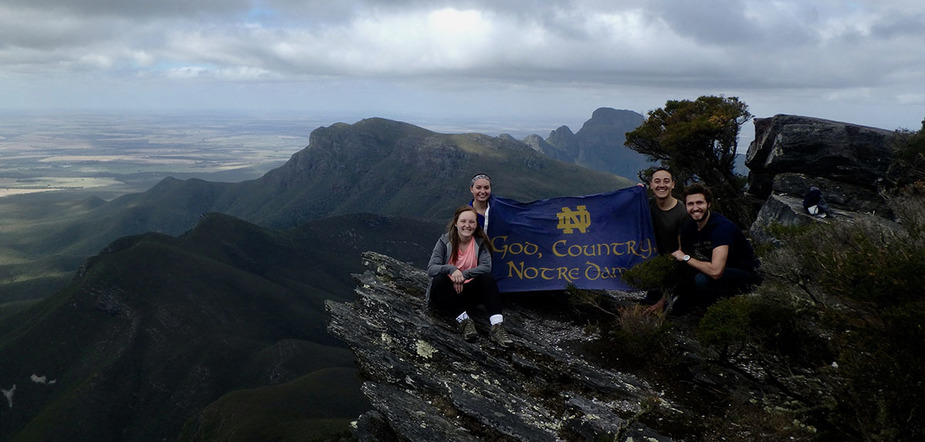
Active Allyship: How to Maintain the Notre Dame Community Abroad
Study Abroad is committed to fostering diversity in our programs and will work with you to find a program that best fits your academic, personal, and professional goals. International education is open and available to students of ALL backgrounds. Regardless of your race, gender, sexual orientation, religion, or level of ability, there is a program for you.
As you consider international travel, it is important to recognize that different social identities may impact your experience abroad in unique ways from that of your peers. We encourage you to maintain the integrity of the Notre Dame community as you embark on study abroad, and we hope that this page will help you explore how your social identities may affect the way you experience life in another country with your fellow students.
Remember the importance of fostering the Notre Dame community abroad and supporting your peers. Whether on campus or abroad, Notre Dame’s Principles of Diversity & Inclusion include respecting the dignity of every person, building a Notre Dame community in which all can flourish, and living in solidarity with all, particularly the most vulnerable. It is important to recognize the role you play in fostering these values while you study abroad.
Study Abroad has compiled information regarding preparing to go abroad, common challenges, questions to ask yourself, and additional resources. We encourage you to contact a Study Abroad program director if you have any location-specific questions or would like to talk to a study abroad returnee.
Preparing to Go Abroad
We support all students and want to provide access to study abroad while simultaneously ensuring you and your fellow travelers have a safe and rewarding experience. There may be challenges you will face abroad as a foreigner or an American. Before you select where to study abroad, it is important to consider your personal identity and how you might fit within a particular culture. It is wise to seek to understand the culture, customs, and expectations of where you will be traveling to avoid finding yourself in an uncomfortable or even a potentially dangerous situation.
Understanding the constructs of your own identity before you go abroad will provide you with a strong sense of self as you interact with your host culture. While you’re abroad, your identity may also play a large part in what shapes your experience, both in how you understand your host country and how you fit in abroad. Studying abroad allows you the opportunity to think about your identity in a new cultural context. The new cultural settings you encounter may emphasize certain aspects of your identity in new or more prominent ways. You may feel more “American” or more “foreign,” or you may find that your identity changes in your new environment.
Your experience will not be defined entirely by how you identify in the United States. We are products of our own experiences and cultures, and the different ways in which we categorize ourselves (or are categorized by others) are interwoven. Each aspect of who we are—what we believe, how we think, how we behave—will impact how we interact with others in a new cultural setting.

Common Challenges
While you are abroad, Study Abroad encourages you to be cognizant of how your identities influence your experience, interactions, and daily life. Therefore, it is also important to recognize that your privilege may make your experiences different from your fellow students or locals. If you want to support others whose identities are marginalized at home or abroad, remember that being an ally requires educating yourself and action. If appropriate, speak up to people who share your privilege if they are being insensitive. We encourage you to discuss challenges that may arise with your local onsite program directors:
- Being challenged with different ideologies, beliefs, and attitudes
- Being asked to represent the United States in class discussions
- Seeing sexism, racism, and homophobia among locals and other students at your host institution
- Understanding how race/ethnicity is viewed differently in your host country
- Understanding the historical relationship between the U.S. and your host country
- Understanding current political issues or immigration issues involving your host and U.S. foreign policy that could impact how locals view Americans
Questions to Ask Yourself
- How do you identify yourself in the United States? How might that change abroad?
- Which aspects of your identity are the most meaningful to you?
- What expectations and preconceived ideas do you have of your host culture?
- How do you imagine yourself interacting in the host culture?
- How do you feel about leaving home and campus? What are you glad to leave behind? What do you think you’ll miss?
- How will laws, attitudes, norms, or behavioral expectations in your host country affect you? Are there specific laws or attitudes regarding the ways in which you identify?
- How flexible are you in the expression of your identity? Would you be willing to keep aspects of your identity private for safety or change your clothing choices?
- How might you feel about the diversity (or lack of diversity) among the other students on your program?
- What resources will you need to be successful abroad, and what resources are available in your host country?
- What issues or problems might other students face that you haven’t thought about or noticed because of your privilege?
- How can you be inclusive and supportive of others who do not share the same privileges as you?
- Are there safety issues I should be aware of regarding my identity in specific countries abroad? If yes, can I stay safe in those locations or should I look for other destinations?
- What is the perception of U.S. citizens in the countries that you are considering?